Welcome To InnoSurgicalCare
Get a Natural Hairline with
FUE Today!
Discover the benefits of FUE Hair Transplant, a minimally invasive procedure for natural-looking hair regrowth. Learn how individual hair follicles are expertly transplanted with minimal scarring and a short recovery time.
Achieve permanent results and regain your confidence today.
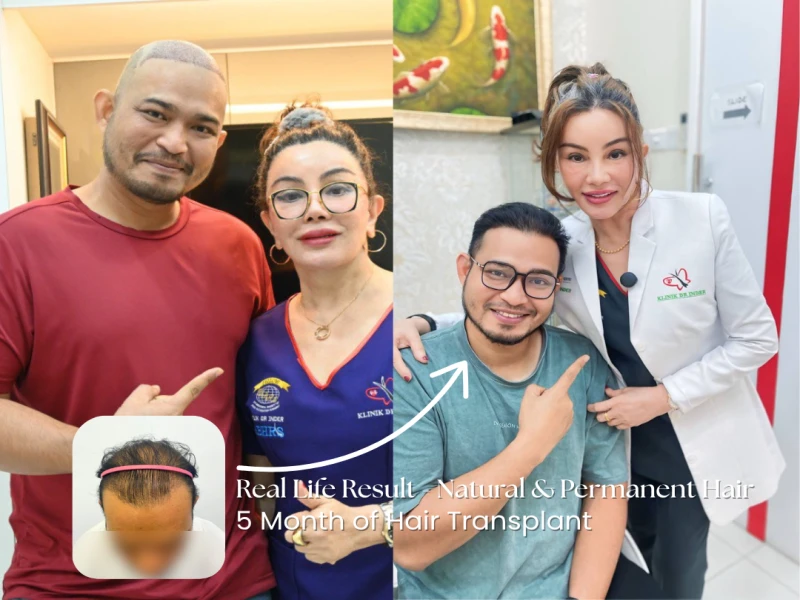
HAIR TRANSPLANT DONE RIGHT
FUE HAIR TRANSPLANT Malaysia
At InnoSurgicalCare, we specialize in Follicular Unit Extraction (FUE) to treat male pattern baldness, classified from stage 1 to stage 7 by the Norwood scale. Our clinic offers both fully-shaven and partly-shaven FUE transplants for all ages, races, and hair types. Using tools of various sizes to accommodate different hair calibers, we ensure precise grafting from the donor to the thinning areas. Our comprehensive service includes post-care treatments and follow-up guidance throughout your recovery journey.
How a FUE Is Performed
At InnoSurgicalCare, we specialize in Follicular Unit Extraction (FUE) to treat male pattern baldness, classified from stage 1 to stage 7 by the Norwood scale. Our clinic offers both fully-shaven and partly-shaven FUE transplants for all ages, races, and hair types. Using tools of various sizes to accommodate different hair calibers, we ensure precise grafting from the donor to the thinning areas. Our comprehensive service includes post-care treatments and follow-up guidance throughout your recovery journey.
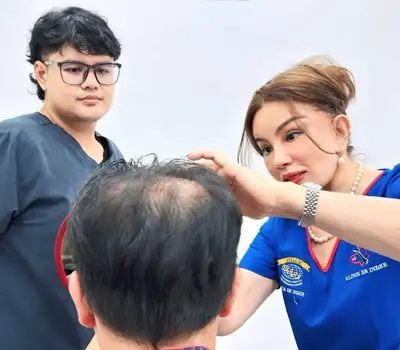
Step 1
Consultation with Doctor
Start your Journey to a Full Head of Hair by an easy appointment with The Best Hair Transplant Malaysia Doctors . Fully Accredited and Internationally Trained Doctors
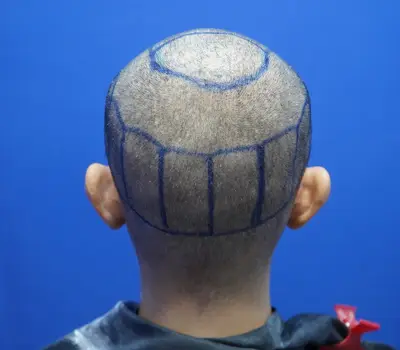
Step 2
Preparing the Donor Area
Firstly, we identify the recipient areas and work to personalize a plan to help you achieve the most nature-looking hairline possible. Next, we trim the hair in your donor area to facilitate the identification and removal of strong, healthy donor hairs.
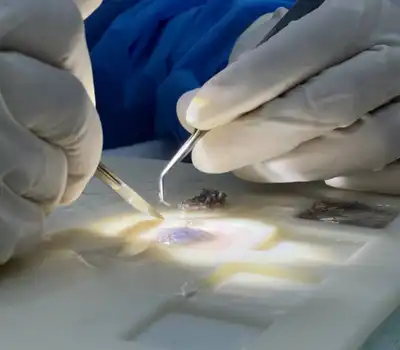
Step 3
Removing and Preparing Hair Follicles
Once the donor area is prepared, we remove individual follicular units from your scalp by making a tiny circular incision around them to isolate the graft. Then we extract the graft from the scalp using a tweezers-like instrument. Working with high-powered stereo microscopes, our trained technicians examine the follicular grafts and prepare them for placement.
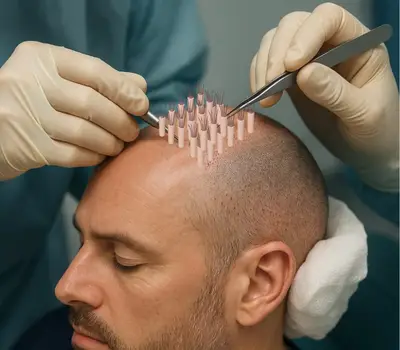
Step 4
Placing the Follicular Units
When the follicular grafts are ready, we make small incisions in your recipient area that match your natural hair growth pattern. The follicular grafts are then strategically placed one by one, according to the number of hairs within each follicle, in order to maximize the naturalness, density and coverage of the thinning areas. This is where the experience and artistry of your FUE physician is critical.
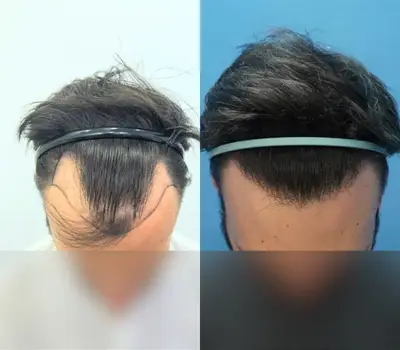
Step 5
FUE healing and Hair growth
The tiny incisions left behind after the follicular units are extracted will heal completely in a few days. Three months after the procedure, you should begin to notice new hair growth. After six months, you should see noticeable regrowth, at which point your native and transplanted hair will continue to grow naturally.
RESULTS
Minimally invasive and natural looking. Each hairline is carefully designed and crafted by the hair transplant doctor by individually harvesting hairs from the back of the head (donor) and expertly implanting them to area affected by hair loss or hair fall. Hair transplants are a painless and permanent treatment for hair loss, and can be done in just one day.
WHAT WE DO
Our Professional Experts
We champion the empowerment of choosing to regrow your hair. At InnoSurgicalCare, we specialize in the world’s best technique for hair transplants: FUE Hair Transplant, at a competitive cost. It takes years of rigorous training to become a FUE doctor, including International Certification from the ABHRS. We boast some of the best hair restoration and hair transplant doctors in the country. We successfully treat thousand of patients each year, and are committed to a first-class patient journey, from first contact to final results.
Meet Our Team
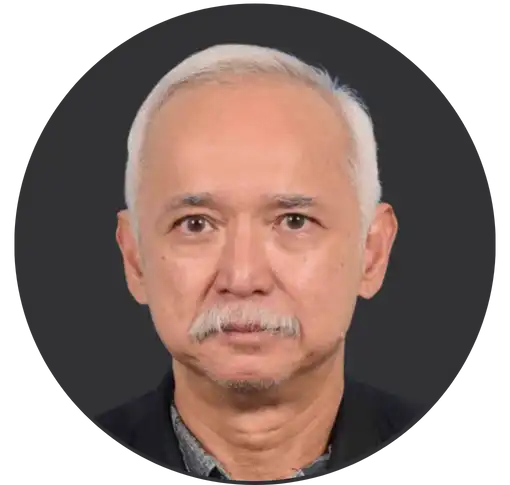
Dr Andre
Mr. Andre Das’ is a leading General Surgeon in the country and remains attached with the Health Ministry as the Head of Department in Hospital Kajang. He holds a MBBS from University of Malaya, FRCS from the Royal College of Surgeons (Edinburgh) and M.MED from the National University of Singapore and has build up a reputation of a very skilled surgeon with experience spanning over 15 years.

Datuk Dr Inder Kaur
CEO / Founder of Klinik Dr Inder
Letter of Credentialing and Privileging,
Aesthetic Medical Practice (LCP)
Fellow of the International Society of Hair Restoration Surgery (FISHRS)
Diplomate of American Board of Hair Restoration Surgery (ABHRS)
Board Certified in American Academy of Aesthetic Medicine USA.

Dr Ashrul Ikhmal
Bachelor of Medicine and Bachelor of Surgery at Management and Science University (2018) Medical Aesthetic Certificate (Part 1- 2022) Special Trainee Doctor under Dato Dr Kula and Datuk Dr Inder Member of FUE Europe Society Associate Member of the International Society of Hair Restoration Surgery (ISHRS)
AWARDS & RECOGNITION
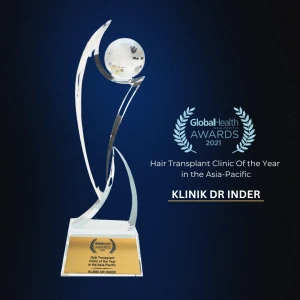
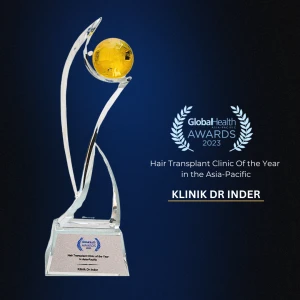
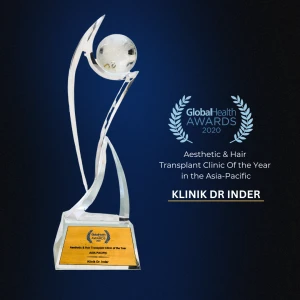


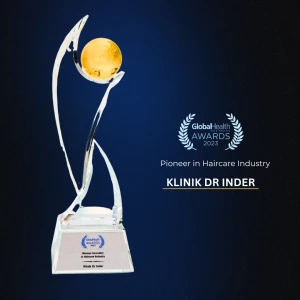
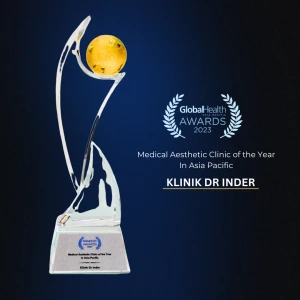

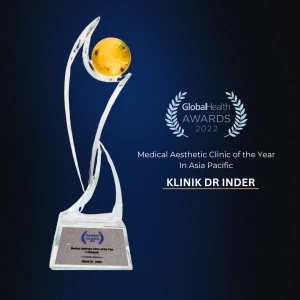

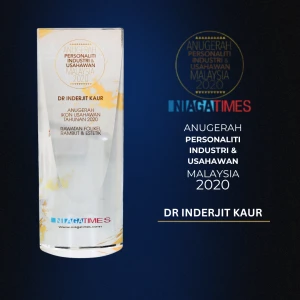

FAQ
FAQ What is the success rate of transplant?
It is around 95% to 98% success rate that lead to a promising result. Followed by proper & right hair care maintenance which will be closely monitored by our experienced Hair Consultant.
How pain (Pain Management) is the FUE procedure?
Bearable pain during the Local Anesthesia Injection (LA) at the front and back scalp. Whole scalp will be numb. No pain and comfortable.
Is hair transplant result permanent?
Hair Transplant is called a permanent solution to the hair loss as the planted hairs are not affected by the activity of DHT in the male body. They are resistant to the DHT which making them not to fall and permanently loss.
What is the recovery period required and available downtime?
Fast recovery period in 1 week approximately with some little downtime such as swelling on forehead, reddish wound recovery, itchiness and etc.
What is the hair growth phases?
The hairs will fall first within the first to second month after the procedure. They will start to grow from internal. After that, the hairs are starting to show up and grow matured in 3 to 4 months onward. Whole journey of hair transplant progress is estimated 1 Year.
SIGN UP NOW TO GET A FREE CONSULTATION
We can help you look younger, achieve healthier hair, and boost your confidence.
